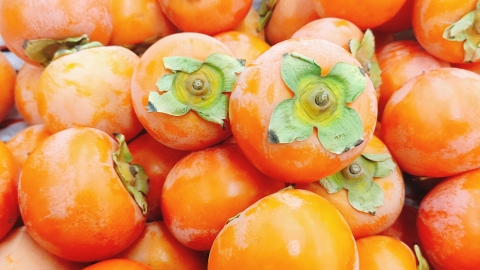What Foods Should Not Be Eaten with Persimmons?
Generally speaking, persimmons are a nutrient-rich fruit, but care should be taken to avoid consuming them with certain foods, mainly crabs, goose meat, sweet potatoes, eggs, and milk, to prevent discomfort. Detailed explanations are as follows:

1. Crabs
Persimmons and crabs are both cold-natured foods. When consumed together, they may intensify cold properties, irritating the gastrointestinal tract and causing symptoms such as abdominal pain and diarrhea. Moreover, tannic acid in persimmons can combine with proteins in crabs to form tannin-protein complexes, which are difficult to digest and may lead to persimmon bezoar.
2. Goose Meat
Goose meat contains high-quality complete proteins. Minerals such as iron in the proteins can combine with tannic acid in persimmons to form complexes that are difficult to digest and absorb, reducing nutritional value and potentially causing symptoms of indigestion such as abdominal pain, vomiting, and diarrhea.
3. Sweet Potatoes
Sweet potatoes contain large amounts of starch, which can stimulate excessive gastric acid secretion after consumption. Tannic acid and pectin in persimmons can then combine with gastric acid to form persimmon stones, affecting gastrointestinal digestion and emptying functions, potentially leading to intestinal obstruction.
4. Eggs
When consumed with eggs, tannic acid in persimmons can bind with proteins in eggs to form tannin-protein complexes, impairing protein digestion and absorption, possibly causing symptoms such as abdominal pain, vomiting, and diarrhea.
5. Milk
Milk contains large amounts of protein, which can precipitate when combined with tannic acid in persimmons, affecting protein digestion and absorption and potentially causing symptoms such as abdominal pain and diarrhea. Additionally, calcium in milk may also bind with tannic acid in persimmons to form complexes that are difficult to digest and absorb.
In addition, eating persimmons on an empty stomach should be avoided. In an empty stomach condition, tannic acid in persimmons can easily combine with gastric acid to form persimmon stones, causing symptoms such as stomach pain and potentially inducing gastric ulcers.






